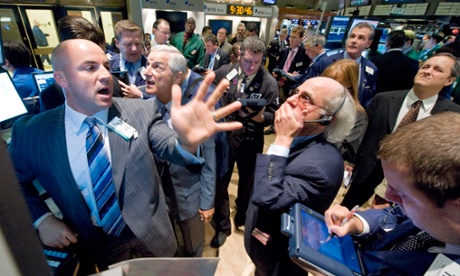
It was almost exactly five years ago that the euro crisis erupted, starting in Greece. Investors who had complacently let all euro-zone countries borrow at uniformly low levels abruptly woke up to the riskiness of an incompetent government borrowing money in a currency which it could not depreciate. There is thus a dismal symmetry in seeing the euro crisis flare up again in the place where it began.
The proximate cause of the latest outbreak of nerves was the decision by the Greek government, now headed by the generally competent Antonis Samaras, to advance the presidential election to later this month.
The presidency is largely ceremonial, but if Mr Samaras cannot win enough votes in parliament for his candidate, Stavros Dimas, a general election will follow. Polls suggest the winner would be Syriza, a populist party led by Alexis Tsipras. Although Mr Tsipras professes that he does not want to leave the euro, he is making promises to voters on public spending and taxes that may make it hard for Greece to stay. Hence the markets’ sudden pessimism.
As it happens, there is a good chance that Mr Dimas, a former EU commissioner, will win the presidential vote at the end of this month (see “Greece’s crisis: Samaras’s gamble”). But the latest Aegean tragicomedy is a timely reminder both of how unreformed the euro zone still is and of the dangers lurking in its politics.
It is true that, ever since the pledge by the European Central Bank’s president, Mario Draghi in July 2012 to “do whatever it takes” to save the euro, fears that the single currency might break up have dissipated. Much has been done to repair the euro’s architecture, ranging from the establishment of a bail-out fund to the start of a banking union. And economic growth across the euro zone is slowly returning, however anaemically, even to Greece and other bailed-out countries.
Related Posts
- 83European Central Bank President Mario Draghi hoped never to see this moment: Consumer prices in the euro region have dropped by 0.2 percent, according to December figures just published: Deflation -- a sustained period of falling prices that discourages consumers from spending and businesses from investing -- threatens to worsen the…
- 81The European Central Bank is poised to impose negative interest rates on its overnight depositors, seeking to cajole banks into lending instead and to prevent the euro zone falling into Japan-like deflation. At its meeting on Thursday, ECB policymakers may also launch a loan program for banks with strings attached…
- 69None of my tickers are showing much action today. Yen crosses are down modestly but nothing compared to the volatility we’ve seen over the past few days. The euro tried the upside a few times today and will close out the day with some small gains but tomorrow the ECB…
- 68Germany's Constitutional Court will refer a complaint against the European Central Bank's flagship "unlimited" bond-buying plan to the European Court, removing the prospect of it curbing the program. The court said on Friday there was good reason to think the scheme "exceeds the European Central Bank's monetary policy mandate and thus…
- 67The European Central Bank announced some measures to ease monetary policy two weeks ago. The euro had been on a downtrend since May and by these measures the ECB increased its support to the economy. The result? Two weeks later, EUR/USD stabilized just above 1.35. This week’s Eurozone economic calendar…


